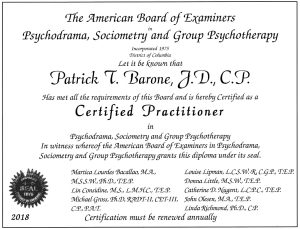Search
Patrick Barone Becomes First Michigan Lawyer Certified as Trainer Educator and Practitioner of Psychodrama
 The Barone Defense Firm is pleased to announce that founding member Patrick T. Barone has become the first Michigan lawyer to obtain certification as a Trainer, Educator and Practitioner (TEP) of Psychodrama.
The Barone Defense Firm is pleased to announce that founding member Patrick T. Barone has become the first Michigan lawyer to obtain certification as a Trainer, Educator and Practitioner (TEP) of Psychodrama.
Having completed the long journey toward CP and TEP certification, Barone recounts the questions he is most frequently asked, which are first and foremost is “what is psychodrama” and a close second; “what does psychodrama have to do with the practice of law?”
Barone asked himself the same questions when he first attended the Trial Lawyer’s College, the story of which is partially recounted in the 2016 Super Lawyer’s article entitled “Walking in Their Shoes, How Barone Defense Firm uses psychodrama to help clients cope with traumatic events.”
 Michigan Criminal Defense Lawyer Blog
Michigan Criminal Defense Lawyer Blog

